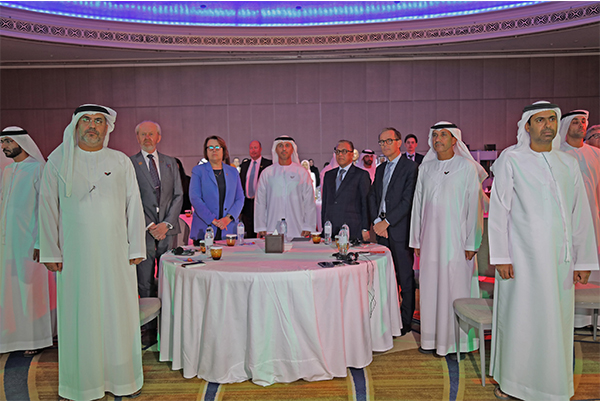 The UAE Space Agency has announced details of the new UAE Space Law issued by HH Sheikh Khalifa bin Zayed Al Nahyan, President of the UAE during a workshop this week. The law was passed by the Cabinet in late 2019 which was headed by HH Sheikh Mohammed bin Rashid Al Maktoum, Vice President and Prime Minister of the UAE, Ruler of Dubai.
The UAE Space Agency has announced details of the new UAE Space Law issued by HH Sheikh Khalifa bin Zayed Al Nahyan, President of the UAE during a workshop this week. The law was passed by the Cabinet in late 2019 which was headed by HH Sheikh Mohammed bin Rashid Al Maktoum, Vice President and Prime Minister of the UAE, Ruler of Dubai.
The workshop was attended by HE Ahmed bin Abdulla Humaid Belhoul Al Falasi, Minister of State for Higher Education and Advanced Skills and Chairman of the UAE Space Agency, Simonetta Di Pippo, Director of the United Nations Office for Outer Space Affairs (UNOOSA) and HE Eng. Mohammed Nasser Al Ahbabi, Director General of UAE Space Agency.
The Space Law aims to create a legislative and regulatory environment for the national space sector in line with the other laws and regulations in the UAE. The new law aims to adhere to international treaties and be clear, transparent, and flexible.
It also aims to protect the UAE’s interests through establishing a balance between economic and commercial requirements, encourage innovation, adhere to the requirements of security, safety, and protect the environment.
The law is being implemented during a transformational time within the global space sector, as the transition to New Space continues to present new opportunities for start-ups and small to medium-sized businesses, including those recently incubated within the UAE in partnership with KryptoLabs and Mohammed bin Rashid Aerospace Hub.
During the ceremony, the UAE Space Agency employees reviewed the regulations of the new law, consisting of 9 chapters and 54 articles that regulate space activities across the UAE and governs the Agency’s role in this regard. Moreover, the new regulation clarifies the mechanism for issuing space activity permits, registering space objects and vehicles, responsibility and insurance regulations for space activities, space accidents and risks regulations, the transitional period for current operators regulations, the provisions for regulating the construction of facilities on other planets, as well as the utilisation of space resources and developing space debris mitigation measures.
Commenting on the new law, HE Ahmed bin Abdulla Humaid Belhoul Al Falasi, said: “The new law regulates space activities to facilitate the development of a prosperous and safe space sector in the UAE, which realises our wise leadership’s vision for the sector. It also sets a clear framework for the rights and duties of officials and establishments operating in this sector and guarantees the rights of all relevant parties, in compliance with the international agreements and treaties signed by the UAE.”
“The law will be a key factor in opening the doors for investment in the national space sector to various global companies, due to its legislative and regulatory environment, which provides foreign investors with assurance ahead of starting their business and projects in the UAE,” he added.
HE Eng. Mohammed Nasser Al Ahbabi, remarked: “The law will contribute to keeping pace with the rapid growth of the space sector and regulating the work of its various stakeholders within one ecosystem that promotes the sector and its capabilities and ensures the optimal use of its resources.”
Nasser Al Rashidi, Director of Space Policy and Regulations at the UAE Space Agency demonstrated stages of the implementation of the Space Law. “The UAE Space Law comes in line with the UAE Vision 2021, the UAE Centennial 2071, the 4th Industrial Revolution Strategy, the Higher Policy for Science and Technology and Innovation, and the National Policy for the Space Sector. The development of this law took into consideration 20 relevant treaties and agreements and compared its elements to more than 18 other national space laws of countries such as the US, Russia, France, Germany, Korea, Hong Kong, Brazil and Kazakhstan among others. The development of the law was also based on key local legislation relevant to the space sector and its activities, such as the civil aviation law, the communications law, commercial companies’ law, IP rights laws, and imports and exports laws. The process also involved consultations with more than 15 relevant parties within the country and other agencies of leading states in the space sector.”
The UAE Space sector has provided 1,500 rewarding jobs, at 57 space-related entities, five space research and development centres, and three universities offering space degrees. Moreover, the commercial space sector in the UAE includes the seventh-largest satellite operator in the world in terms of revenue, Al Yah Satellite Communications Company (Yahsat), and Thuraya Telecommunications Company (Thuraya).












Add Comment